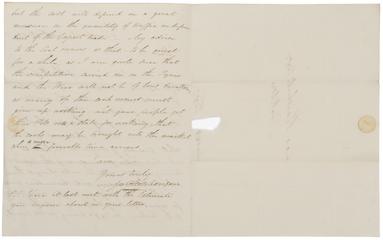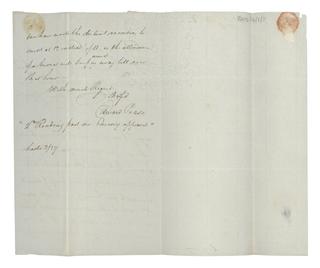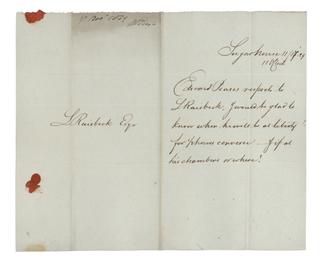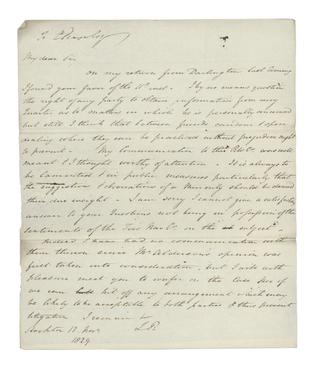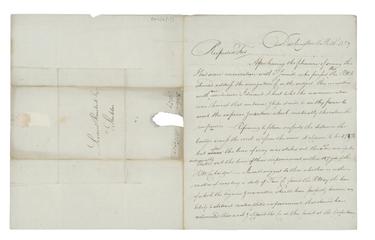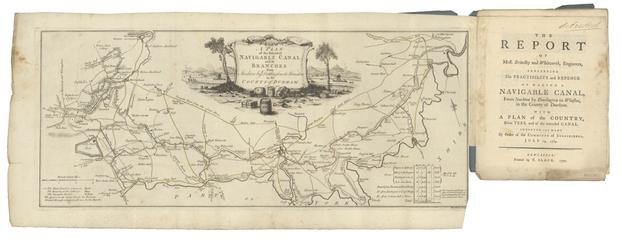
Raisbeck, Leonard
Leonard Raisbeck was a promoter and pioneer of the Stockton and Darlington Railway in North East England, the world’s first public railway. Born on 14 April 1773 and baptised at St Thomas' Parish Church in Stockton-on-Tees on 11 May 1773, Leonard Raisbeck, one of three siblings, came from a prominent family in Stockton-on-Tees. The Raisbeck family had become local landowners and civic dignitaries over the course of the 18th century. His grandfather, Thomas Raisbeck, and father, John Stapylton Raisbeck, were both legal professionals and both of whom served as mayor of Stockton-on-Tees; they were both members of the Merchant Adventurers Company and the Freelage of Newcastle, however, it not known if Raisbeck assumed his rights to membership of these bodies. Leonard followed in his forebears’ footsteps into the law, being apprenticed to his father's firm in 1789 and took it over in 1793. On Leonard’s retirement in 1840 it was renamed Newby's and still exists to date under that name across County Durham. John Staplyton Raisbeck also partly owned the Sugar House, a sugar refinery in Stockton-on-Tees, set up in 1780; although the business was sold in 1790, the family continued to have some involvement in its affairs beyond this date. Leonard Raisbeck married Mary (nee Robinson, his cousin) on 2 May 1807. The couple did not have any children, but they took on parental responsibility for Mary's orphaned nieces and nephews.
Raisbeck was the first figure to suggest that any link between Stockton-on-Tees, Darlington and the South Durham coalfields could take the form of a railway, making the proposal at a dinner celebrating the opening of the Mandale cut of the River Tees on 18 September 1810. He often championed the cause of a railway against prevailing sentiment, since, during the initial stages of the Stockton & Darlington’s Railway (S&DR)’s development, there was debate over whether to build a railway or canal. Raisbeck and Francis Mewburn, who was based in Darlington, were appointed as joint solicitors and secretaries to the S&DR. Their relationship was a strained one as Mewburn appears to have felt he was the Stockton man’s professional superior.
In addition to his role as solicitor of the S&DR, Raisbeck also served as solicitor of the Tees Navigation Company (TNC), which on occasion presented him with a difficult balance to strike between the interests of the two companies. He was also closely acquainted with Edward Pease, a notable local Quaker businessperson and leading figure in the development of the S&DR. Whilst their relationship was cordial, there was a painful rupture over the plan to extend the railway to Middlesbrough. The Pease family and other S&DR proprietors enthusiastically pursued the extension plan, however, Raisbeck was in strong opposition as it presented a threat to the interests of the town of Stockton and those of the TNC. This incident led to Raisbeck’s resignation from S&DR in 1828, however, despite his resignation, Raisbeck seems to have remained involved with the S&DR’s administration thereafter.
Outside of his railway legal work, Raisbeck served as Recorder of Stockton, after which his civic responsibilities expanded to encompass the County of Durham when he was appointed a Deputy Lieutenant of the county on 11 April 1831. Early in the 19th century, he served as colonel in the Stockton Loyal Volunteers, a local military unit raised to counter the threat of French invasion, he served as Chairman of the Stockton-on-Tees Conservative Association. He died on 26 July 1845, survived by his wife, Mary, with whom he shares a memorial plaque inside Stockton Parish Anglican Church. His funeral was well-attended, and as marks of respect the mayor ordered that all shops in Stockton cease trading during the ceremonies and the church was hung with ceremonial cloths.
